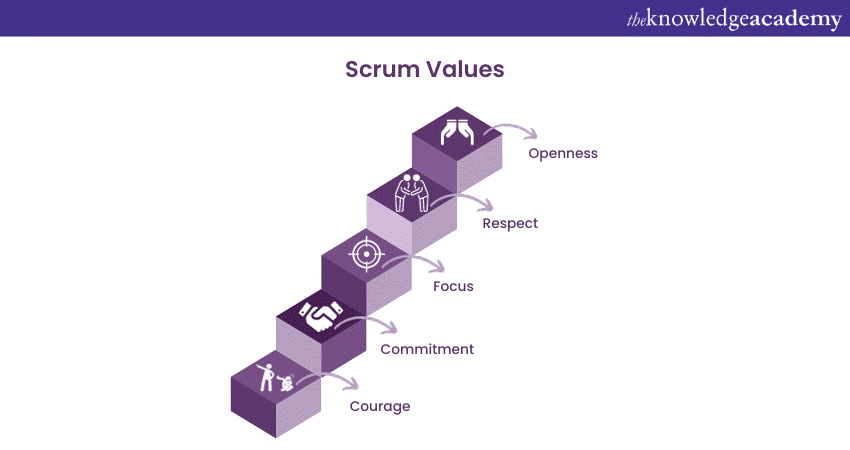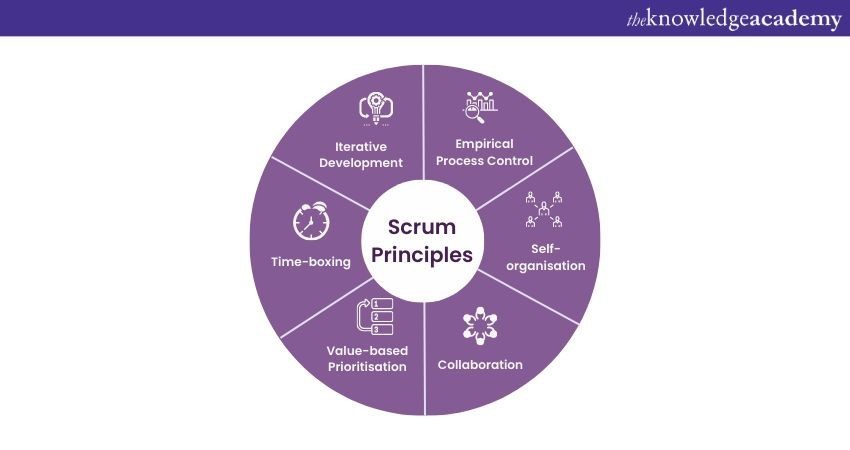We may not have the course you’re looking for. If you enquire or give us a call on 01344203999 and speak to our training experts, we may still be able to help with your training requirements.
Training Outcomes Within Your Budget!
We ensure quality, budget-alignment, and timely delivery by our expert instructors.

Scrum Values and Principles are essential to the Scrum philosophy followed by modern-day organisations. Scrum is an Agile framework that assists project teams in creating flexible and speedy software development processes within an organisation. A team must understand its values and principles to follow and abide by the Scrum framework.
According to a survey by Statista, Scrum is used by 37% of respondents, making it one of the most popular software development methodologies. In this blog, you will learn about Scrum Values and Principles, their purpose, and how they affect development. So, keep reading to find out more. So, keep reading to find out more!
Table of Contents
1) What is Scrum exactly?
2) What are Scrum Values and Principles?
3) What are Scrum Values?
4) What are Scrum Principles?
5) How to implement these ideas?
6) Conclusion
What is Scrum exactly?
Scrum is a well-known Agile framework frequently used for developing, sustaining and delivering products. This framework is well known for its lightweight, incremental and iterative nature and is commonly used to manage complex projects.
The word Scrum was inspired by the game Rugby, referring to a stage of the game where a team plays closely with each other. Scrum was used in a product development context for the first time by Ikujiro Nonaka and Hirotaka Takeuchi in 1986. They argue that Scrum would bring continuous and incremented innovation. This framework was most frequently used in Software Development, and with time it has found a wider acceptance.
The Scrum framework strongly encourages close collaboration between team members, allowing them to self-organise with others. Scrum aims to enable a team to be adaptive to evolving circumstances and take necessary approaches to deal with unpredictable events. Scrum philosophy believes unexpected changes should be accepted for what they are. Thus, Scrum is an excellent alternative to sequential plans, which are rendered useless in the face of unpredictability.
What are Scrum Values and Principles?
Scrum is an empirical approach, meaning it strongly relies on trial and error to find success. For an empirical approach, the feedback at the end of the process matters greatly. The Scrum framework relies on specific values and principles which enable people to abide by the three pillars of Scrum. They are as follows:
1) Transparency: Visibility within a product, process and team
2) Inspection: Verification and validation of a product and process
3) Adaptation: Adjustment based upon circumstances as per need
The Values and Principles of Scrum enable members of the Scrum Team, such as Scrum Masters and Developers, to build a collaborative work environment. Scrum Values can be considered internal values of a team, such as a code of conduct and ethics. Embracing these Scrum Values not only fosters teamwork but also contributes to the professional growth of individuals, potentially leading to rewarding career paths and competitive Scrum Master salary opportunities
While Scrum Values are considered an internal code of conduct, Scrum Principles are considered external guidelines applied to a business. These principles ensure the Scrum framework is appropriately used in a business environment. While Scrum Values determine a team member's behaviour, the Scrum Principles decide its functioning within an organisation.
Scrum Values are often confused with Scrum Principles, as they are part of the same framework. However, both have different applications, trying to achieve the same goal.
Gain detailed knowledge of Scrum Master techniques with Scrum Master Certification!
What are Scrum Values?

Scrum Values refer to the code of ethics that each team member should follow on a personal level. Scrum Values play a major factor in building a foundation that allows a Scrum Master to implement Scrum Principles later.
Commitment
Commitment is the first Scrum Value, which refers to taking the initiative and responsibility for the work. It should not be confused with simple tasks such as following instructions, meeting deadlines, or having a positive attitude. The Scrum Value of commitment goes beyond that, referring to dedication to your team’s goals.
Think of your team as a military unit, where each soldier, including you, has a complicated set of tasks. But beyond these tasks lies a common goal: your team’s greater goal. How quickly the team gets to this goal depends on how you prioritise your tasks beyond the bare minimum expected from you.
Your team’s trust in you arises from how much effort you add to your task, just like your trust in them depends on them doing their tasks. Every small step you make shows your commitment beyond your individual duties, such as identifying a problem or solving a future crisis for your team. These small actions can bring tremendous success to your team in the future.
Courage
Courage is the second factor of Scrum Values which refers to your resilience to intimidating problems your team may face. Problems we encounter in life, including work, often have multiple solutions with varying results. While there is an easy approach to such issues, they lead to mediocre results.
While an easy approach to a problem may seem convenient, it often has a riskier approach that demands creativity and boldness. This doesn’t mean you should instead take unnecessary risks but be unwavering while faced with hurdles as you try to do the right thing.
There will be times when you can take shortcuts in your work, but a part of you will wish for more remarkable results. That sentiment is the essence of Courage in Scrum Values. This is not limited to working hard but how you carry yourself against challenges. Maybe you have an idea which can simplify a task and achieve the same results your team desires. Your ability to speak up and share that idea without fear of rejection is also courage.
Focus
Scrum often divides a project into specified periods to achieve a task, referred to as a Sprint. Any distraction within a Sprint result in lower efficiency and much-dreaded overwork. Focus is a part of Scrum Values, which allows you to eliminate potential distractions, speeding up your work process.
The more focused everyone in a team is, the higher the likelihood of a team completing its task on time. The benefits of Scrum Values are only visible in the presence of teamwork and collaboration. This also applies to focus, which is one of the five values of Scrum. If the number of tasks you have been given is reducing the work quality of each task, discuss this with the Scrum Master.
Discussing your limits with your team during meetings allows them to map the time frame accordingly. As a result, you would only be allotted several tasks you can focus on and achieve on time. But focus doesn't just refer to a reduction in the number of tasks. It also accounts for how well you handle and manage the number of tasks you take.
Openness
Openness is a part of Scrum Values which defines how accepting you are of the ideas of others and how open-minded they are for yours. Openness refers to honesty and transparency. An instance where you feel hesitant about talking about a roadblock hindering your progress can sabotage the future goals of your team.
Openness fosters an environment that allows people to be honest about their issues. Only then you and your team members will be able to come up with a solution once the problem is addressed.
Openness isn’t limited to simply communication; it also extends to how accepting you are of your workers' ideas. You can trust them and get their help in the right circumstances by recognising them for their strengths. Similarly, your team members’ potential to seek your aid will equally depend on how much you abide by the openness aspect of Scrum Values.
Respect
Respect is an aspect of Scrum's values that will determine how you treat others and their treatment towards you. As a team member, you should realise that everyone has their strengths and weaknesses. A good team is filled with individuals who recognise not only their strengths but the strength of others and respect them for them.
Each member of your team is capable of creativity and innovation aside from the skills they already possess. Your team may not see the same degree of success in the absence of one of its members. Acknowledging each one for their respective expertise creates greater trust between team members.
Respect doesn’t just stop at your team members and extends to all individuals affiliated with your working process. According to Scrum Values, respecting your customers and stakeholders for their needs is as important as respecting your senior’s criticism based on experience.
What are Scrum Principles?

Scrum Principles are the laws and regulations a Scrum team member should abide by when interacting and working within an organisation. They focus on the outcomes and external results of its implementation rather than its internal processes. Understanding the Advantages and Disadvantages of Scrum is crucial for team members to apply these principles effectively.
Empirical process control
As discussed previously, Scrum is an empirical process. This means rather than relying on a pre-established plan, it changes and adapts to the need of its circumstances. This process is found on three pillars of Scrum - Transparency, Inspection and Adaptation. These pillars focus on analysing the process and its effect and learning from it.
As an Empirical process, Scrum is all about trial and error and repeating until succession. The term adaptation thus plays a major part as it determines how well a team handles unpredictable circumstances. According to this Scrum Principle, adaption occurs on each iteration of Scrum, based upon the deviation.
Self-organisation
Ownership of individual roles and accountability for your tasks is vital in Scrum Principles. Self-organisation determines how much freedom and responsibility each member of a Scrum team possesses. It is essential for a Scrum team member to have the space to self-organise rather than their actions going through micromanagement.
Allowing freedom to team members allows them to be creative and innovative in approaching a problem. This fosters the growth for pride in one’s achievement, thus improving accountability for results. This cannot be achieved when the team’s action is limited, and its members are led by the nose.
Collaboration
Scrum Principles put great emphasis on teamwork, also known as collaboration in Scrum. A team’s ability to trust each other’s skills and expertise allows them to collaborate on their task. According to this Scrum Principle, team members should be able to put personal motives aside and work towards the benefit of the team and the product.
Value-based prioritisation
A Scrum Team might often find themselves in a situation where they have multiple tasks at hand. Under these circumstances, each member should be able to organise their work based on the priority of the project. Due to the adaptive nature of Scrum, this priority is ever-changing until the completion of the project.
Time-boxing
As discussed previously, Scrum divides its work based on a standard period called a Sprint. This Scrum Principle of dividing specific time for certain tasks is called time-boxing. Time boxing helps a team plan and schedule different tasks and their executions, which also comes under Scrum Events. Time-boxing includes these elements in Scrum:
1) Sprints: Scrum Sprints refer to dividing the entire project's tasks into small work segments. Each Sprint should be completed in each timeframe, and typically, each Sprint lasts for two to four weeks. After completing the previous Sprint, the team can only start working on the next Sprint.
2) Sprint planning meetings: Sprint planning meetings are held to discuss the tasks allotted to the next Sprint. These meetings can last from an hour to two.
3) Daily stand-up meetings: These meetings are where team members monitor and discuss the state of ongoing work. Any issues faced by an individual are discussed in this meeting. These meetings usually last for 15 minutes.
4) Sprint review meetings: Sprint review meetings are held to review and discuss former accomplishments, the state of work done and the previous Sprint release cycles. This meeting allows a team to discuss if they were able to achieve their previous goals.
Iterative development
The nature of the Scrum Framework makes it very volatile; as a result, Scrums will vary from one project to another. The Scrum Principle of iterative development shows how requirements for a project evolve. This allows a team to root out the bottlenecks in a product development process. These changes can be based upon previously encountered problems and design flaws on changing customer needs.
In some instances, like Software Development, it's common for Developers to visit the previous framework and improve upon its flaws. Iterative development focuses on how well these changes are managed and integrated within a framework.
How to implement these ideas?
Implementing Scrum Values and Principles in a project or organisation involves adopting a specific framework for Agile Project Management. Scrum is based on five core Values and several Principles that guide its implementation. Here's how you can implement Scrum Values and Principles:
Commitment to Scrum Values
Scrum is built on five core values that should be embraced by the entire team:
a) Commitment: Team members should be committed to achieving the goals and delivering value to the customer. This commitment means doing whatever it takes to meet the Sprint goal.
b) Courage: Team members should have the courage to speak up, address issues, and take calculated risks. Open communication and transparency are essential.
c) Focus: The team should maintain focus on the Sprint goal and prioritise work that contributes to that goal. Avoiding distractions and multitasking is crucial.
d) Openness: Transparency is key in Scrum. Team members should be open about their work, progress, and any obstacles they encounter. This helps in making informed decisions.
e) Respect: Team members should respect each other's expertise and perspectives. A respectful and collaborative environment promotes effective teamwork.
Scrum roles
Scrum roles play a vital part in facilitating effective collaboration, ensuring accountability, and fostering a streamlined development process. The three key roles in Scrum are:
a) Product Owner: Responsible for defining and prioritising the product backlog, ensuring the team works on the most valuable features, and making decisions about the product.
b) Scrum Master: Facilitates Scrum events, helps the team overcome obstacles, and ensures adherence to Scrum principles and values.
c) Development Team: Cross-functional team responsible for delivering potentially shippable product increments by the end of every Sprint.
Ensure these roles are clearly defined, and individuals understand their responsibilities.
Scrum events
Scrum prescribes specific events to facilitate collaboration and inspect and adapt the work. These include:
a) Sprint planning: At the beginning of each Sprint, the team plans the work to be done during the Sprint.
b) Daily standup: A brief daily meeting where the team discusses progress, challenges, and plans for the day.
c) Sprint review: A meeting at the end of the Sprint to demonstrate the product increment and gather feedback.
d) Sprint retrospective: A reflection meeting where the team discusses what went well, what could be improved, and how to make those improvements.
Scrum artefacts
Scrum defines three key artefacts:
a) Product backlog: A prioritised list of all the work that needs to be done on the product.
b) Sprint backlog: The subset of items from the Product Backlog selected for the current Sprint.
c) Increment: The sum of all completed and potentially shippable product backlog items at the end of a Sprint.
Ensure these artefacts are actively maintained and used to drive work.
Empirical process control
Scrum is based on empirical process control, meaning that it encourages teams to regularly inspect and adapt their processes. Encourage continuous improvement by conducting Sprint Retrospectives and making adjustments based on feedback.
Adaptation and inspection
Regularly inspect the product and the process, and adapt as needed. Use metrics and feedback to make data-driven decisions and improve over time.
Self-organising teams
Allow the development team to self-organise and make decisions about how to best accomplish the work. Trust their expertise and give them the autonomy to manage their work.
Collaboration and communication
Promote collaboration and open communication among your team members, stakeholders, and customers. Regularly involve the Product Owner and stakeholders in the process to ensure alignment with business goals.
Conclusion
Hopefully, with this blog, you gained an in-depth knowledge of the ethical codes of Scrum Values and the necessity of Scrum Principles. Also, know to express your values and principles in your interview answers by going through Scrum Master Interview Questions. Thank you for reading!
Learn about common Scrum-based terminologies with the Scrum Overview course!
Frequently Asked Questions
Upcoming Project Management Resources Batches & Dates
Date
 Scrum Master Certification
Scrum Master Certification
Thu 23rd May 2024
Thu 30th May 2024
Thu 6th Jun 2024
Thu 13th Jun 2024
Thu 20th Jun 2024
Thu 27th Jun 2024
Thu 4th Jul 2024
Thu 18th Jul 2024
Thu 25th Jul 2024
Thu 1st Aug 2024
Thu 8th Aug 2024
Thu 15th Aug 2024
Thu 29th Aug 2024
Thu 5th Sep 2024
Thu 19th Sep 2024
Thu 26th Sep 2024
Thu 3rd Oct 2024
Thu 10th Oct 2024
Thu 17th Oct 2024
Thu 24th Oct 2024
Thu 31st Oct 2024
Thu 7th Nov 2024
Thu 21st Nov 2024
Thu 5th Dec 2024
Thu 19th Dec 2024







 Top Rated Course
Top Rated Course




 If you wish to make any changes to your course, please
If you wish to make any changes to your course, please


